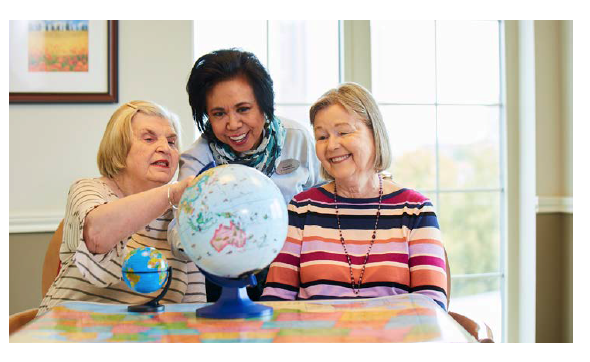As seniors age, their health, lifestyle and care needs evolve, and with those changes come planning for long-term care. Determining the right lifestyle choice for you or a loved one can be a daunting task, and every person and situation is different. Seniors don’t always realize or accept that they need more help, and family members aren’t always aware of the need until a crisis happens.
If you are seeing changes in health, memory or behavior in yourself or a loved one, it may be time to consider assisted living. More than 800,000 Americans reside in assisted living communities according to the American Health Care Association/National Center for Assisted Living. Older adults in an assisted living facility have the opportunity to enjoy a high quality of life, with purposeful daily activities and socialization, while receiving caregiving from trained employees and prompt access to medical or emergency care when needed.
How do you know when it’s time for assisted living? Here are some common indicators to look for that indicate a need for more support.
8 Signs to Look For
- Mixing up medications
- Running out of medication
- Skipping doses or overdosing
- Having difficulty ordering meds from the pharmacy
- Exercising poor nutritional habits
- Skipping meals
- Weight loss
- Increasing difficulty in performing activities of daily living
- Bathing less frequently
- Changes in hygiene
- Wearing the same clothes multiple days
- Frequent falls
- Home is not adapted for mobility and health needs
- Help is not nearby in case of a fall
- Short-term memory loss
- Misplacing things in odd places
- Trouble re-tracing steps
- Forgetting to turn off the stove
- Becoming fearful of living alone
- Afraid at night
- Overly dependent on family members
- Neighborhood becoming less safe
- Experiencing lack of socialization
- Becoming isolated at home
- Becoming depressed, often from the loss of spouse, long-time friends or relatives
- Losing interest in favorite activities
- Difficulty going to social gatherings
- Difficulty maintaining the house and yard
- Avoiding laundry and housekeeping
- Clutter accumulation
- Poor lawn maintenance
It’s important to assess your current living situation and start considering the level of care needs, independence, environment, safety, health care and daily needs you or a loved one will need in the near future.
Learn more about your senior living options and decide the best fit for your long-term care needs with this quick 4-5 minute assessment.

